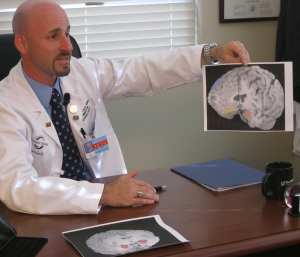

MedFriendly®


Neuropsychologist
A neuropsychologist is a professional psychologist
that studies and practices neuropsychology.
Neuropsychology is the study of the relationship
between the central nervous system (brain and spine)
and behavior, from birth to old age.
Psychology is the study and profession concerning
behavior and the related functions and processes of
both the mind and body, in human and non-human
animals.
FEATURED BOOK: Neuropsychological
3. An amount that has been specified as a standard of measurement, weight, or any type
of scale or system that is formed by multiplication or fractions. An example would be a
gram, which is a small unit of weight.
4. An area of a hospital that has personnel and equipment that are capable of treating
patients with a particular condition, illness, or other common problem. For example, some
hospital have a burn unit where burn victims are treated and care for. Most well known,
however, is the Intensive Care Unit (ICU).
WHAT DO NEUROPSYCHOLOGISTS DO?
"Where Medical Information is Easy to Understand"™
WHAT DOES IT TAKE TO BECOME A NEUROPSYCHOLOGIST?
First and foremeost, a neuropsychologist should have a doctoral
degree in clinical psychology from an accredited university or
college. The neuropsychologist must have completed coursework in
neuropsychology and other neurosciences such as neuroanatomy
(the study of the structure of the brain and spinal cord) and
neuropathology (the study of disorders of the brain and spinal
cord). It is highly recommended that aspiring neuropsychologists
attend a graduate school program that complies with the guidelines
for neuropsychological training set forth by Division 40
(Neuropsychology) of the American Psychological Association.

Neuropsychologists have many different types of jobs and not every neuropsychologist does the same
thing. Many neuropsychologists administer psychological tests and perform assessments to diagnose
specific disorders of the brain. These brain disorders most often result in problems with thinking,
emotions, and/or behavior. Neuropsychologists study ways to measure recovery from brain damage as
well as strategies to rehabilitate (make better) people with brain damage and improve their care.
Neuropsychologists also provide psychotherapy (a psychological treatment through talking) to patients
with brain damage and try to understand ways in which a patient's environment (for example, family)
improve or worsen a brain damaged patient's overall condition. Although neuropsychologists also study
the functioning of the spine, most neuropsychologists focus on the functioning of the brain.
Neuropsychologists also teach courses in colleges and universities about neuropsychology, intelligence
testing, personality testing, and/or other topics. Many neuropsychologists conduct research to better
understand the functioning of the brain. They usually do this by studying brain damaged patients and
comparing them to patients who have not suffered brain damage.
It is also recommended that aspiring neuropsychologists do an internship (one year of supervised
training at the end of graduate school) at a program that meets the guidelines set forth by Division 40 of
the American Psychological Association and the International Neuropsychological Society. To become
a neuropsychologist, a psychologist should have at least two years of supervised experience providing
neuropsychological services to patients in a clinical setting. Neuropsychologists also need to be
licensed psychologists in the state or province that they practice in.
After receiving a doctoral degree, it is recommended that aspiring neuropsychologists do addition
training at a program that has been approved by the Association of Postdoctoral Programs in Clinical
Neuropsychology. To assure that you are being served by a neuropsychologist who is competent to
practice neuropsychology, it is recommended that you see a board-certified neuropsychologist (see
question below).
WHAT IS A BOARD CERTIFIED NEUROPSYCHOLOGIST?
Any neuropsychologist can apply to the American Board of Clinical Neuropsychology and/or the
American Board of Professional Neuropsychology to become board certified. The neuropsychologist
that is board certified has been agreed upon by a board (group) of peers (other neuropsychologists) to
meet the rigorous standards necessary to practice neuropsychology, and has achieved the highest
level of education possible in this field. Pediatric neuropsychologists can be board certified by the
above boards but some are board certified through the American Board of Pediatric Neuropsychology.
WHAT SHOULD I BE CAREFUL OF WHEN CHOOSING A NEUROPSYCHOLOGIST?
It is important to keep in mind that there are many psychologists who have no formal training in
neuropsychology who call themselves neuropsychologists. One way to find out if this is so is to
research the educational background of neuropsychologists in your area. To assure that you are being
served by a neuropsychologist who is competent to practice neuropsychology, it is recommended that
you see a board-certified neuropsychologist (see question above).
WHAT IS THE ORIGIN OF THE WORD NEUROPSYCHOLOGIST?
Neuropsychologist comes from the Greek word "neuron" meaning "nerve," the Greek word "psyche"
meaning "mind," and the Greek word "logos" meaning "the study of." Put the words together and you
have "the study of (the) mind (and) nerves."














